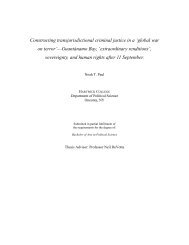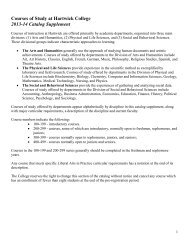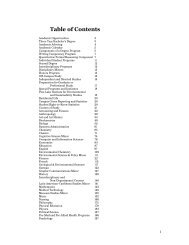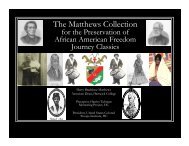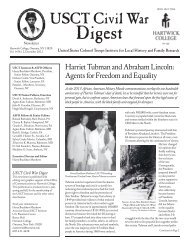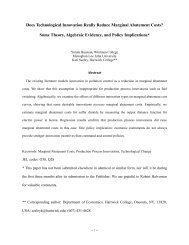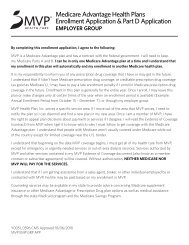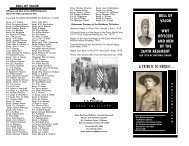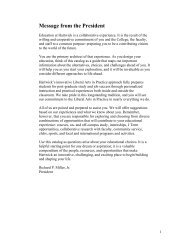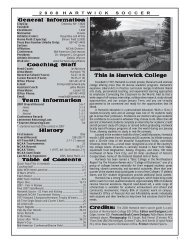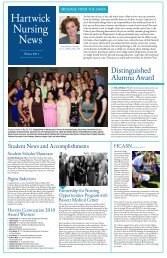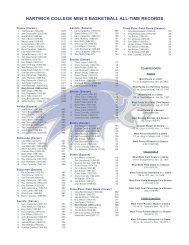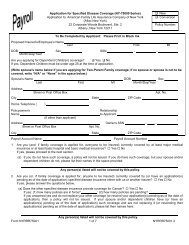Table of Contents - Hartwick College
Table of Contents - Hartwick College
Table of Contents - Hartwick College
Create successful ePaper yourself
Turn your PDF publications into a flip-book with our unique Google optimized e-Paper software.
History<br />
We use the word ‘history’ to define both past events and accounts <strong>of</strong> those<br />
events. All past and current cultures throughout the globe made and make<br />
sense <strong>of</strong> their experiences within historical perspectives, whether<br />
genealogical, mythic, magical, or analytical. In Western traditions the<br />
ancient Greeks saw history as a form <strong>of</strong> knowing based on inquiry <strong>of</strong><br />
particular things. Since the classical era, Western historians have sought<br />
to understand the past through careful analysis <strong>of</strong> evidence in the form <strong>of</strong><br />
documents and other physical remains <strong>of</strong> past cultures with the<br />
assumption that the past and the present are closely linked and that in<br />
understanding the past we might avoid previous mistakes and fashion a<br />
better future. Within this framework, learning history is first and<br />
foremost learning the methodologies for studying the past and mastering<br />
the discipline to apply these methodologies effectively. The faculty<br />
members in the History Department are committed to the students<br />
learning the discipline and practicing it.<br />
Recent scholarly debate among historians around the globe, however, has<br />
challenged the presumptions <strong>of</strong> objectivity and scientific disinterest<br />
implied by the traditional model <strong>of</strong> the discipline. The new perspective<br />
argues that practicing historians are engaged in their subjects with a<br />
political commitment and passion that guides research agendas and our<br />
understanding <strong>of</strong> documents. Nevertheless, rather than making historical<br />
analysis impossible, this recognition <strong>of</strong> the personal involvement <strong>of</strong><br />
anyone who tries to understand the past places even more emphasis on<br />
applying the discipline with care and self-awareness. We cannot learn the<br />
truth about past cultures, but we can develop hypotheses about their<br />
values and legacies. Even with tentative conclusions, we can come to a<br />
fuller and more critical understanding <strong>of</strong> our own cultures and an<br />
appreciation <strong>of</strong> the cultures <strong>of</strong> others. This is the goal for learning that is<br />
supported by the department’s faculty members.<br />
The Program: <strong>Hartwick</strong>’s history program (courses, opportunities for<br />
individual study, <strong>of</strong>f-campus experiences) is intended to heighten<br />
students’ understanding <strong>of</strong> the complexities <strong>of</strong> the cultural roots <strong>of</strong><br />
contemporary America and the historical forces that have produced the<br />
increasing interdependency <strong>of</strong> cultures across the globe. Exploring<br />
history, whether as part <strong>of</strong> a liberal education or as a major, engages<br />
students to question the historical ‘truths’ <strong>of</strong>fered as justifications <strong>of</strong><br />
current systems <strong>of</strong> power and inequality. Students also learn to analyze<br />
information critically and to test generalizations (including their own).<br />
Departmental <strong>of</strong>ferings cover American, Latin American, European, and<br />
Global histories. Classroom experience emphasizes active student<br />
learning through class discussion, group work, peer critiques, and<br />
individual presentations. Regularly <strong>of</strong>fered courses cover topics as diverse<br />
as Slavery and Abolition in the United States, Issues in Indian Country<br />
Today, Gender and Power in Latin America, The Renaissance, World War<br />
II and the Home Front, and the History <strong>of</strong> Western Medicine since 1500.<br />
Special topics courses can cover themes ranging from the religious lives <strong>of</strong><br />
medieval women to American autobiographies. The history faculty also<br />
141



